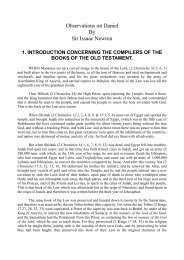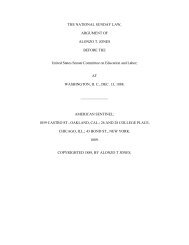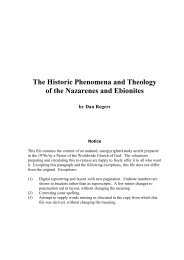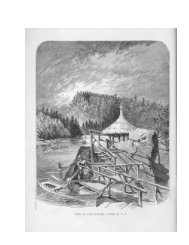THE EARLY CHRISTIAN SABBATH - Friends of the Sabbath Australia
THE EARLY CHRISTIAN SABBATH - Friends of the Sabbath Australia
THE EARLY CHRISTIAN SABBATH - Friends of the Sabbath Australia
You also want an ePaper? Increase the reach of your titles
YUMPU automatically turns print PDFs into web optimized ePapers that Google loves.
The Early Christian <strong>Sabbath</strong><br />
has made us rest from our works, for <strong>the</strong> meditation upon Thy laws. He suffered for us by<br />
Thy permission, and died, and rose again by Thy power: on which account we solemnly<br />
assemble to celebrate <strong>the</strong> feast <strong>of</strong> <strong>the</strong> resurrection on <strong>the</strong> Lord's day, and rejoice on<br />
account <strong>of</strong> Him who has conquered death, and has brought life and immortality to light.<br />
Thou did give <strong>the</strong>m <strong>the</strong> law or Ten Commandments, which was pronounced by Thy voice<br />
and written with Thy hand. Thou did enjoin <strong>the</strong> observation <strong>of</strong> <strong>the</strong> [seventh-day] <strong>Sabbath</strong>,<br />
not affording <strong>the</strong>m an occasion <strong>of</strong> idleness, but an opportunity <strong>of</strong> piety, for <strong>the</strong>ir<br />
knowledge <strong>of</strong> Thy power, and <strong>the</strong> prohibition <strong>of</strong> evils. Having limited <strong>the</strong>m as within an<br />
holy circuit for <strong>the</strong> sake <strong>of</strong> doctrine, for <strong>the</strong> rejoicing upon <strong>the</strong> seventh period.” - Ibid.,<br />
book 7, section 3, chapter 36, in The Ante-Nicene Fa<strong>the</strong>rs, Volume 7, Page 474.<br />
At least one <strong>of</strong> <strong>the</strong> contributors to this document, who pretended falsely to write<br />
in <strong>the</strong> name <strong>of</strong> Peter and Paul, would have felt much at home with a modern five-day<br />
week. - He says:<br />
“I Peter and Paul do make <strong>the</strong> following constitutions. Let <strong>the</strong> slaves work five<br />
days; but on <strong>the</strong> <strong>Sabbath</strong> day and <strong>the</strong> Lord's day let <strong>the</strong>m have leisure to go to church for<br />
instruction in, piety. We have said that <strong>the</strong> <strong>Sabbath</strong> is on account <strong>of</strong> <strong>the</strong> creation, and <strong>the</strong><br />
Lord's day <strong>of</strong> <strong>the</strong> resurrection.”-Ibid., book 8, section 4, chapter 33, in The Ante-Nicene<br />
Fa<strong>the</strong>rs, volume 7, Page 495.<br />
Evidently <strong>the</strong> writers <strong>of</strong> <strong>the</strong> Constitutions <strong>of</strong> <strong>the</strong> Holy Apostles believed in<br />
<strong>Sabbath</strong> keeping. They kept <strong>the</strong> Sunday, but <strong>the</strong>y did believe in keeping <strong>the</strong> <strong>Sabbath</strong>, and<br />
<strong>the</strong>y advocated it.<br />
The Council <strong>of</strong> Laodicea provided very distinctly, in Canon 16, as previously<br />
pointed out, for regular public <strong>Sabbath</strong> worship. Basil, who is accounted one <strong>of</strong> <strong>the</strong> great<br />
fa<strong>the</strong>rs <strong>of</strong> <strong>the</strong> Eastern Church, made <strong>the</strong> <strong>Sabbath</strong> day one <strong>of</strong> <strong>the</strong> days <strong>of</strong> <strong>the</strong> week upon<br />
which he celebrated <strong>the</strong> communion. He says:<br />
“I, indeed, communicate four times a week, on <strong>the</strong> Lord's day, on Wednesday, on<br />
Friday, and on <strong>the</strong> <strong>Sabbath</strong>, and on <strong>the</strong> o<strong>the</strong>r days if <strong>the</strong>re is a commemoration <strong>of</strong> any<br />
saint.” - Letter 93, in Nicene and Post-Nicene Fa<strong>the</strong>rs, Second Series, volume 8, page<br />
179.<br />
<strong>Sabbath</strong> observance was also common around AD 400 among <strong>the</strong> monks <strong>of</strong> <strong>the</strong><br />
church, especially in <strong>the</strong> East. There was a man by <strong>the</strong> name <strong>of</strong> John Cassian, who<br />
traveled extensively among <strong>the</strong> Eastern monasteries, <strong>the</strong>n moved to France and while in a<br />
monastery <strong>the</strong>re wrote two important essays on monastic life. In discussing <strong>the</strong> way <strong>of</strong><br />
living followed by <strong>the</strong> monks, he tells us <strong>the</strong>y observed <strong>the</strong> <strong>Sabbath</strong>. He says:<br />
“Wherefore, except Vespers and Nocturns, <strong>the</strong>re are no public services among<br />
<strong>the</strong>m in <strong>the</strong> day except on Saturday [<strong>Sabbath</strong>] and Sunday, when <strong>the</strong>y meet toge<strong>the</strong>r at<br />
<strong>the</strong> third hour [nine o'clock] for <strong>the</strong> purpose <strong>of</strong> Holy communion.” - Institutes, book 3,<br />
chapter 2, in Nicene and Post-Nicene Fa<strong>the</strong>rs, 2d Series, volume 11, Page 213.<br />
“On those days, -i. e., on Saturday, [<strong>Sabbath</strong>] and Sunday, and on holy days, on<br />
which it is usual for both dinner and supper to be provided for <strong>the</strong> brethren, a Psalm is<br />
not said in <strong>the</strong> evening. But <strong>the</strong>y simply make a plain prayer and come to supper, and<br />
again, when <strong>the</strong>y rise from it, conclude with prayer alone.” - Ibid., book 3, chapter 12, in<br />
Nicene and Post-Nicene Fa<strong>the</strong>rs, 2d Series, Volume 11, Page 218.<br />
Cassian also tells <strong>of</strong> a hermit whose religious customs show how <strong>Sabbath</strong> was still<br />
being kept:<br />
“He constantly put <strong>of</strong>f taking food until on Saturday [<strong>Sabbath</strong>] and Sunday he<br />
48

















